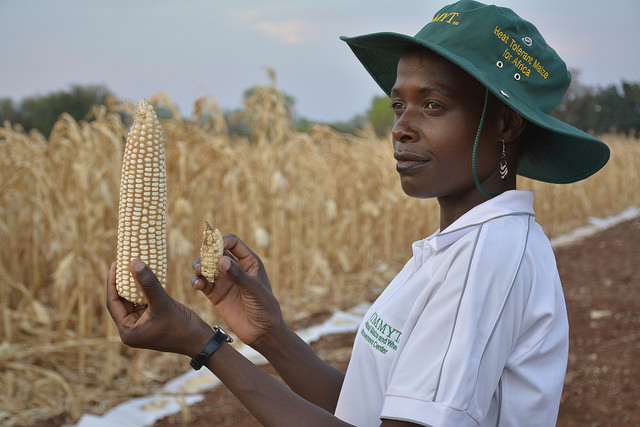
MEXICO CITY (CIMMYT) – As the world’s changing climate makes it more difficult to feed a growing population, smallholder farmers need sustainable solutions to improve food security and livelihoods while adapting to the impacts of climate change. Stress tolerant crop varieties offer much-needed answers, as one of the “10 best bet innovations for adaptation in agriculture” according to a new working paper from the CGIAR Research Program on Climate Change, Agriculture and Food Security (CCAFS).
The paper taps into decades of agricultural research for development conducted by CGIAR research centers to identify the top innovations for climate adaption in agriculture. As world leaders convene for the UN Climate talks in Bonn this week and make a potential decision on agriculture, countries are being encouraged to adopt and advance best practices in their National Adaptation Plans.
Climate change has led to increased incidences of drought, heat and extreme weather events as well as crop pests and diseases, all of which can severely limit the growth of staple crops such as maize, wheat, rice and potato. As the demand for staple crops such as maize is expected to increase by 60 percent by 2050, this poses a grave danger for global food production.
CGIAR Research Centers and Programs have long worked to develop stress tolerant crop varieties that allow smallholder farmers to sustainably increase food security despite climate change. One key example of this work is the Drought Tolerant Maize for Africa project, implemented through the International Maize and Wheat Improvement Center (CIMMYT) and the CGIAR Research Program on Maize (MAIZE) with support from the Bill and Melinda Gates Foundation. From 2010-2016, the project released over 200 stress tolerant maize varieties for smallholder farmers in 13 countries in Africa, which has the potential to generate between $362 million to $590 million over a 7 year period through both yield gains and reduced yield variability.On-farm trials have found that climate resilient maize varieties yielded up to 20 percent more maize under stress prone conditions, and double in severe stress environments, such as the El Niño event of 2015/16. This can significantly increase household income and food security. A recent study on drought-tolerant maize varieties in Zimbabwe found that climate resilient maize could provide farming families with an additional 9 months of food, or $240 per hectare, in drought-prone regions. Based on these results, drought-resilient crops have been dubbed a Tesla-like innovation for agriculture by Dr. Bruce Campbell, Director of the CGIAR Research Program on Climate Change, Agriculture and Food Security (CCAFS)
The benefits are not limited to Africa alone—in South Asia, 18 pre-commercial heat tolerant maize hybrids from the Heat Tolerant Maize for Asia (HTMA) have been licensed. Of these, 6 have broad adaptation across agro-ecological zones in South Asia (suggesting they likely possess both heat and drought tolerance) and 12 hybrids had good adaptation to specific mega-environments in Bangladesh, Bhutan, India, Nepal and Pakistan.
To be successful, crop breeding needs to stay several steps ahead of climate change. The paper argues that strengthened breeding systems, using the latest technologies, together with more open international exchange of germplasm, and rapid change in varieties are fundamental components of this adaptation strategy. In addition, strengthened breeding pipelines for climate resilient maize also offer the co-benefit of faster development of maize with pest and disease resistance or enhanced nutrition in addition to tolerance to other stresses. In Malawi, Zambia and Zimbabwe maize varieties are now on the market with both drought tolerance and high pro-vitamin A content, which can prevent blindness in children. Research is currently underway to develop drought and heat tolerant, nutritionally enhanced maize rich in pro-vitamin A and zinc.
CIMMYT, MAIZE and other CGIAR research centers and programs are dedicated to supporting smallholder farmers in climate change adaptation by delivering stress tolerant crop varieties through strengthened breeding systems, cutting-edge technologies and the open exchange of international germplasm. The adaption innovations outlined in this working paper must be considered and supported in the search for a food secure, climate resilient future for all.
For more information on the 10 innovations highlighted in this paper, please click here.
At this year’s UN Climate Talks at COP23 in Bonn, Germany, CIMMYT is highlighting innovations in wheat and maize that can help farmers overcome climate change. Click here to read more stories in this series and follow @CIMMYT on Facebook and Twitter for the latest updates.

 Climate adaptation and mitigation
Climate adaptation and mitigation